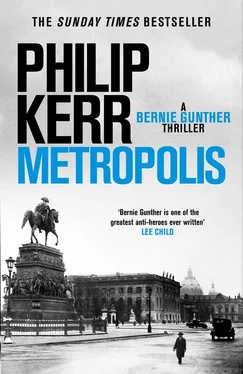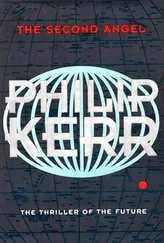‘I’d hate to comb your hair, Erich. I’d probably cut myself.’
‘Could be your own luck will turn tonight.’
‘I hope it does. This case needs a break.’
‘I’ve got a good feeling about that, Gunther. You’re going to crack this case wide open and turn yourself into a local hero. I’m sure of it. You’re going to catch Eva’s murderer. That man is going to have his head cut off. And I’m going to be there to see it, even if I have to bribe every guard in Plötzensee.’
He meant it, too. And just for a second I gained a small insight that perhaps Erich Angerstein was the wickedest thing in the club. I glanced around at the cabaret audience, just to make sure: Lucy was gone now, her hopes as dead as the Archduke Franz Ferdinand and his poor wife. I had not thought vicious, conscience-free killing was so very common in Berlin. But in the Cabaret of the Nameless, it was the name of the game; and worse was to come. A one-eyed juggler with a bad speech impediment who couldn’t juggle; a grossly overweight impersonator who pretended to be Hitler and then Charlie Chaplin but looked and behaved more like Oliver Hardy; and a tap dancer who had no more sense of rhythm than a dying rhinoceros. Worst of all perhaps was the woman with the large breasts who fancied herself a mezzo-soprano and inexplicably had chosen to sing an aria from Richard Strauss’s Salomé and Elow had persuaded the poor creature that she might find more favour with the audience if, like Salomé, she removed her clothes while she was singing — this provided the most depressing sight of the evening when Salomé turned out to have a very large caesarian scar. Even Prussian Emil seemed to find this revelation too much, and soon after Salomé had left the stage, he and his hook-heeled girlfriend suddenly stood up and headed for the exit. Angerstein tossed some banknotes onto the table for the waiter and the twins. Then he and I followed our bewigged quarry outside.
‘Where shall we pick him up?’ I asked.
‘This is your picnic basket, copper.’
‘You said you had someone tail him to his place in Wedding?’
‘Yes, it’s on Ackerstrasse. You see it and you’ll understand why he’s on the flypaper with the rest of them in that club we just came out of.’
‘Well, let’s pick him up there. Are you in your Mercedes?’
‘Not tonight. It’s having a little tune-up. Get it back first thing tomorrow.’ He pointed at a little two-seat Hanomag. With its single headlight mounted in the middle of the hood, it looked more like a car in a children’s storybook than something a man such as Erich Angerstein might drive. ‘Which is why I’m driving that piece of shit toy. It’s my wife’s car. She’s away on vacation right now, so she doesn’t need it.’
Prussian Emil drove a black Dixi north up Mauerstrasse, which traced the path of the old city wall. The curve of the street used to irritate Frederick the Great: Like any good Prussian, he much preferred straight lines. I was hoping to get a few myself when we caught up with Prussian Emil. With Angerstein driving, we headed across the river, into Red Wedding. It was red for a reason; like Schöneberg or Neukölln, the poverty in Wedding was the dispiriting kind they’d had back in Gaza, where sightless Samson had been forced to work grinding grain in a mill. Crushing poverty was the reason none of the thousands of Berliners who occupied Wedding’s sorry-looking tenement buildings would ever have dreamed of voting for anyone other than the communists or, at a pinch, the socialist SPD. Judging by the peeling signs painted on the grey walls of the Russian-doll courtyards, all human life was here: coalmen, dressmakers, butchers, pumpernickel bakers, car mechanics, kosher bakers, pigeon shops, cleaning ladies, briquette suppliers, fishmongers, housepainters; and quite a bit that was inhuman, too. The place was rat-infested, patrolled by mangy stray dogs and spavined horses and probably a Golem or two. Anything went in Red Wedding, and nobody paid much attention to what was deemed respectable by middle-class Berlin standards. Although it was the middle of the night, there were still small, undernourished children loitering in the lightless arched entryways under the watchful eyes of men and women wearing shabby Trachts and military surplus. It was the kind of place that made you feel lucky if you had a clean collar and a shine on your shoes.
‘I hate this bloody neighbourhood,’ confessed Angerstein.
‘Any particular reason, or are you just a student of fine art and architecture?’
‘I grew up here. That’s the best reason of all.’
‘Yours must have been quite an education.’
‘That’s right. It was. I’ve had a lucky escape, right enough. Whenever I come back to Wedding it reminds me of what life might have been like if I’d had to — well, you know.’
‘Make an honest living? Yes, I do see that.’
‘No, you don’t. Nobody who hasn’t lived here can know what it’s like to grow up in a shit hole like this.’
Angerstein slowed the car to a halt for a moment; since he knew exactly where Prussian Emil’s car was going he wasn’t afraid of losing him. He looked at me with eyes that were brown and unflinching and almost lifeless, like cold rock pools in granite. They were the most intimidating eyes I’d ever seen. Gradually he smiled, but it took a while and there was little mirth in it.
‘You see that stone bench? That’s the Wedding gamblers’ bench. My father sat on that bench for twenty years, playing skat and betting away what money he made from whatever temporary crap job he’d managed to get while my mother slaved her guts out taking in laundry and making children’s clothing. I swore I wasn’t ever going to end up like those poor bastards. The number of times since then I’ve wished I could go back in time and give them just a few hundred reichsmarks. Which would have transformed their lives. And mine.’ He shook his head. ‘Sometimes it seems like it must have happened to someone else. Like a schizophrenic, you know? You ever want to know why people become criminals, just come and spend some time here and you’ll learn a thing or two.’
‘Not everyone who lives here becomes a criminal, Erich. Some people manage to stay honest. A few even manage to better themselves. The hard way.’
‘You’re right, of course. But mostly they get stuck here, see? Living their hopeless lives. And I’m not. If I had to live in Wedding again I think I’d kill myself. Or someone else, more likely. But murder’s not such a big crime when you live in a dump like Wedding. That’s called binding arbitration around these parts. A quick way to resolve disputes, one that doesn’t involve cops or courts. Leastways, not unless someone opens his flap.’
His laugh reminded me of just how dangerous a man he was. The Middle German Ring was one of the most feared in the whole of Germany.
‘Which violates the first law of Wedding: Always keep your mouth shut, especially when there’s a cop around.’ He shook his head. ‘I got out of this place for the sake of my family. I wanted something better for my children, you know? And when Eva got her Abitur , I couldn’t have been more proud. Kids round here wouldn’t even know how to spell Abitur . I was even proud when she got herself a job working as a stenographer for Siemens-Halske. I could have found her something better, but she was independent and wanted it that way. So I let it be. I didn’t interfere. Then something went wrong. I’m not sure what, exactly. Maybe a bad boyfriend, I don’t know. I’m still trying to find out. She started taking cocaine and going on the sledge now and then to help pay for it. You might even say she started to revert to type. And now that Eva’s dead I’m wondering why I bothered. Would she be alive now if we’d still been living here? I don’t know.’
Читать дальше












